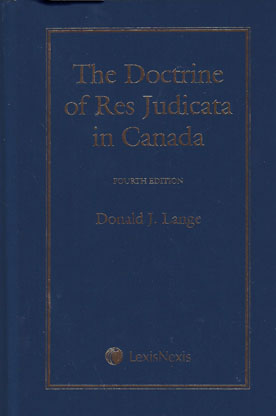
This fourth edition is the most recent volume on the doctrine of res judicata by Canada's recognized legal scholar on the subject, Donald J. Lange. The text is the definitive resource on an important legal doctrine: why a person can only sue or be sued once for each case.
The book's analysis, terminology and description of the law have been adopted by the Supreme Court of Canada, and have been cited on numerous occasions by courts and tribunals across Canada. The text provides a comprehensive distillation of the res judicata doctrine that has evolved in 200 years of Canadian jurisprudence.
Topics Covered in This Book:
What's New in the 4th Edition
An Indispensable Tool For:-